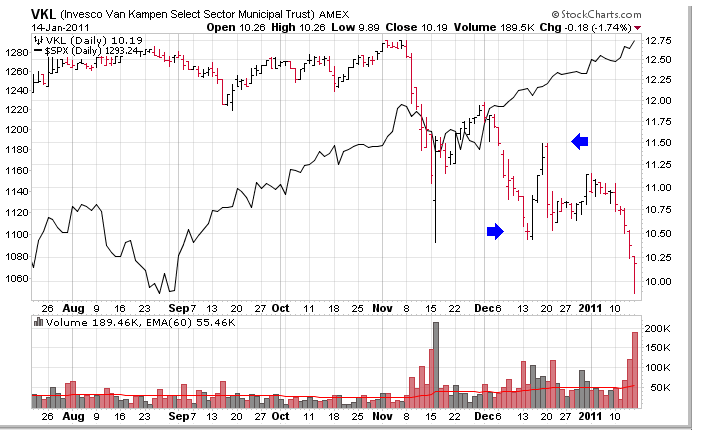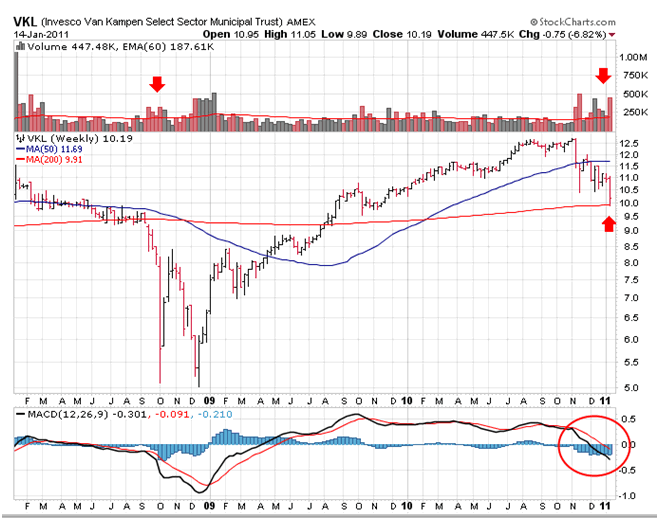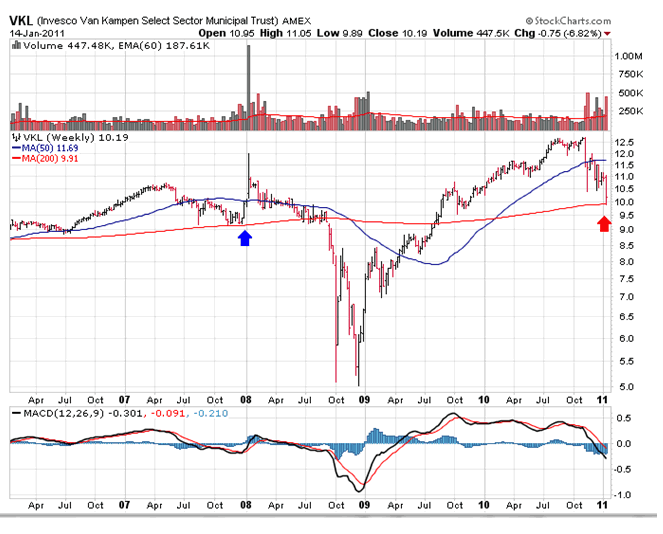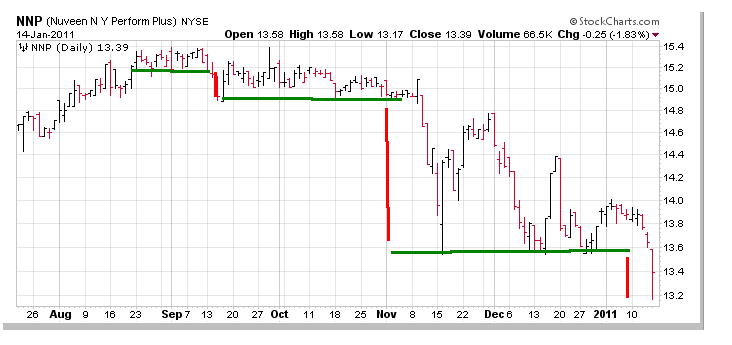Bear Stalks the Municipal Bond Market
Interest-Rates / US Bonds Jan 17, 2011 - 10:09 AM GMTBy: Dennis_Elam
 Vanguard Funds notified the SEC it will not market three new municipal bond funds designed to emulate various municipal bond indices. Hmm, perhaps Vanguard instead should have brought a bear muni bond ETF to market.
Vanguard Funds notified the SEC it will not market three new municipal bond funds designed to emulate various municipal bond indices. Hmm, perhaps Vanguard instead should have brought a bear muni bond ETF to market.

Historic Observation - In early 2010 I wondered if we would see a repeat of 1987. Then bond prices started down in March while stock prices marched up to August. The difference in the dividend yield on stocks and the interest rate payment on bonds became wider and wider. All that was erased one Monday in October 1987 when the stock market crashed. Then it was a bond market in general lead by Treasuries.
Today - This is not a crash prediction but the same thing is happening now. Be sure to read the hyperlink about Vanguard above. Municipal bond funds are primarily owned by retirees. As a former broker I can testify that this group tracks their investments daily and are very worried about potential principal loss. As the muni market fell in November bond funds touted that, as always, if you liked it at 12.75 ( for say this fund) you will love it at 10.50! PIMCO even put out a release that its Chief Guru Bill Gross was personally buying more such funds. But as we have said, defaults take many forms.
And in the oh by the way department, remember that such fund prices are at best estimates. Each day funds get representative quotes on their holdings. But if there are no bids, what is the quote, an estimate at best.
Investors are defaulting, so to speak, on their long term commitment to municipal bonds. As we reported yesterday, New Jersey had to cut the size of an offering. Municipalities are being shut out of their source of long term funding. And this is happening at a time when their operational budgets are all short. Former Minnesota Governor Tim Pawlenty observed on Fox Sunday last night that 49 of 50 states have budget deficits.
Now the same thing is happening that happened in 1987 but so far it is more confined to Municipals. But let's think about the Crash of 2008. The housing bubble led to over exposure to sub prime mortgages which led to Lehman et al using short term commercial paper to finance leveraged holdings of mortgages. When the mortgages stopped paying the commercial paper could not be paid and the entire financial market froze. Here we have a market beginning to freeze in slow motion so to speak.
In 2008, Secretary of Treasury Paulson begged for $700 Billion, and got it. But the markets still continued their plunge. My point here is to ask, what will it take to assure muni investors that they should hold rather than sell their positions?
Markets descend or ascend to assume new trading ranges. The blue arrows indicate the first post crash range for municipal bonds. Now bonds are descending to a new lower range. Finance.yahoo indicates the yield for this fund is a whopping 8.6%. That is 400 basis points over Treasuries and 680 points more than the dividend yield on S & P stocks. Such increases always indicate fear that dividends will be cut.

There are several serious concerns here in this weekly chart of the same fund.
•Prices are falling much faster now than in 2008 at the far left.
•Prices have already hit the 200 week moving average MA.
•Selling volume shown the the down arrow at far right, is already higher than at the worst time of the sell off in late 2008 shown by the down arrow at far left.
•In short, investors are selling municipal bonds faster than they did in the last crisis.
•In the bottom panel, the MACD has headed down. Note that it never stopped until full crash mode occurred in late 2008.
Going back even further, bonds did make one last stand in 2007.

It appears that some party intervened and got prices back up at a similar juncture at the blue arrow in late 2007. But now the MACD is falling at a much more rapid rate. There was one big week volume spike in late December 2007 which screams intervention by some market makers. As usual in such instances, it was not to last.
Bernanke has suggested the municipal bond situation can be 'controlled.' If so, Ben's control had best begin right here right now.
One more thing...the stair step down pattern shown here is typical of a 'stealth' bear market. The market drops, the brokers and funds assure everyone it is a 'normal' correction, the fund drops again, the funds assure everyone that it takes courage but the great bargains are at the lows, and then of course the price drops even lower to yet another new trading range. Commercial paper barely rates a few sentences in the finance and accounting textbooks, yet it became the very center of the 2008 melt down. Municipal bonds are another quiet sector that gets little mention in the textbooks but .......

By Dennis Elam
http://www.themarketperspective.com
Dennis Elam is a forty year veteran of the financial markets. He began his career in 1972 working for Ross Perot in the most extensive training program ever undertaken by a Wall Street firm. He was eyewitness to the crushing bear market of 1972-73 as the Dow Jones Industrials slid from 1,000 plus to 577 in two years. He re-entered the brokerage business in the early 1980s. After extensive study of technical analysis including the methods of Wells Wilder, Robert Prechter, John Murphy, and others, he opened his own securities office. He enjoyed considerable success trading fixed income markets for institutional clients. Extensive study of the markets has led to the importance of studying internal market dynamics rather than the often misleading but frequently quoted stock market indices.
He has written extensively on both fixed income and the oil markets for West Texas newspapers. He has provided television and radio commentary on economic markets.
Mr. Elam holds both BBA and MBA from the University of Texas at Austin. His PhD from UT Austin is in Leadership.
Copyright © 2011 Dennis Elam - All Rights Reserved Disclaimer: The above is a matter of opinion provided for general information purposes only and is not intended as investment advice. Information and analysis above are derived from sources and utilising methods believed to be reliable, but we cannot accept responsibility for any losses you may incur as a result of this analysis. Individuals should consult with their personal financial advisors.
© 2005-2022 http://www.MarketOracle.co.uk - The Market Oracle is a FREE Daily Financial Markets Analysis & Forecasting online publication.



